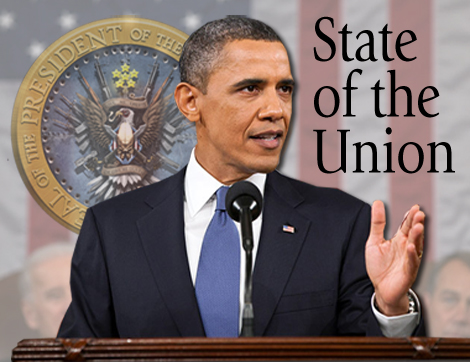
By Mark Anderson
President Barack Obama’s State of the Union address (SOTU) January 28 was a steady stream of domestic success stories and policy pledges that present the American people with a number of promising changes. Yet, along the way, the second-term president revealed, and at times ignored, some troubling details that need to be closely examined.
While Obama pledged to “end the permanent war footing” of the United States, he did so without addressing any details of recent reports that U.S. and associated North Atlantic Treaty Organization (NATO) forces could remain in Afghanistan through 2024 to some degree. The president mentioned that a small U.S.-NATO contingent would stay in Afghanistan to train local forces, but he did not elaborate.
He did add that he wants “to avoid large-scale deployments that deplete our strength,” though such large-scale deployments backed by Obama over the last six years have indeed depleted the U.S. in terms of blood and treasure. Hopefully, this latest statement is a sign Obama has learned from America’s military blunders and is not simply exercising his rhetorical skills.
In the days leading up to the SOTU address, several legislators, including House Armed Services Committee Chairman Howard McKeon, expressed concerns that the Iraqi city of Fallujah had fallen to terrorist forces—with some legislators pondering whether the U.S. would have to return to Iraq if Iraq’s own forces cannot ensure the nation’s security.
Still, the president announced other laudable goals, including:
- “An independent state for Palestinians,” although he pledged his fealty to the state of Israel as well.
- Economic reforms, including less taxation of small business and incentives to restore manufacturing in the U.S.—a sector of the economy he said is already showing signs of gradual recovery.
- An intention to veto any new sanctions against Iran. And he added that engaging Iran at the bargaining table should be no problem, since the U.S. regularly held talks with a much tougher foe, the Soviet Union, during the Cold War.
- A renewed call to close the U.S. Naval prison at Guantanamo, Cuba, although many observers have heard this pledge before without results. Obama called on Congress to lift restrictions, which prevent detainees from being transferred out of “Gitmo.”
- “Prudent limits on the use of drones”—although his administration is accused of the egregious abuse of armed drones targeting numerous innocent civilians.
On the negative side, Obama said he intends to push a new immigration law, even if it means using an executive order to bypass Congress—a dangerous, unconstitutional plan that would legalize millions of illegal aliens hiding out in America.
After Obama’s speech, House Speaker John Boehner (R-Ohio) warned him against invoking too many executive orders, saying such a move would violate the Constitution’s checks and balances.
In the economic realm, one stunning revelation, amid items that could help lift the nation out of its economic doldrums, was Obama’s announced support for two pending trade pacts: One for the Asia-Pacific region, and the other for the U.S. and Europe. The first of the two trade deals is the widely distrusted Trans-Pacific Partnership—which many call the North American Free Trade Agreement on steroids. The other deal is a likely Bilderberg Group goal, which is also supported by NATO and other globalist outfits.
Critics say these trade deals will diminish the very manufacturing sector that Obama believes is in recovery mode.


